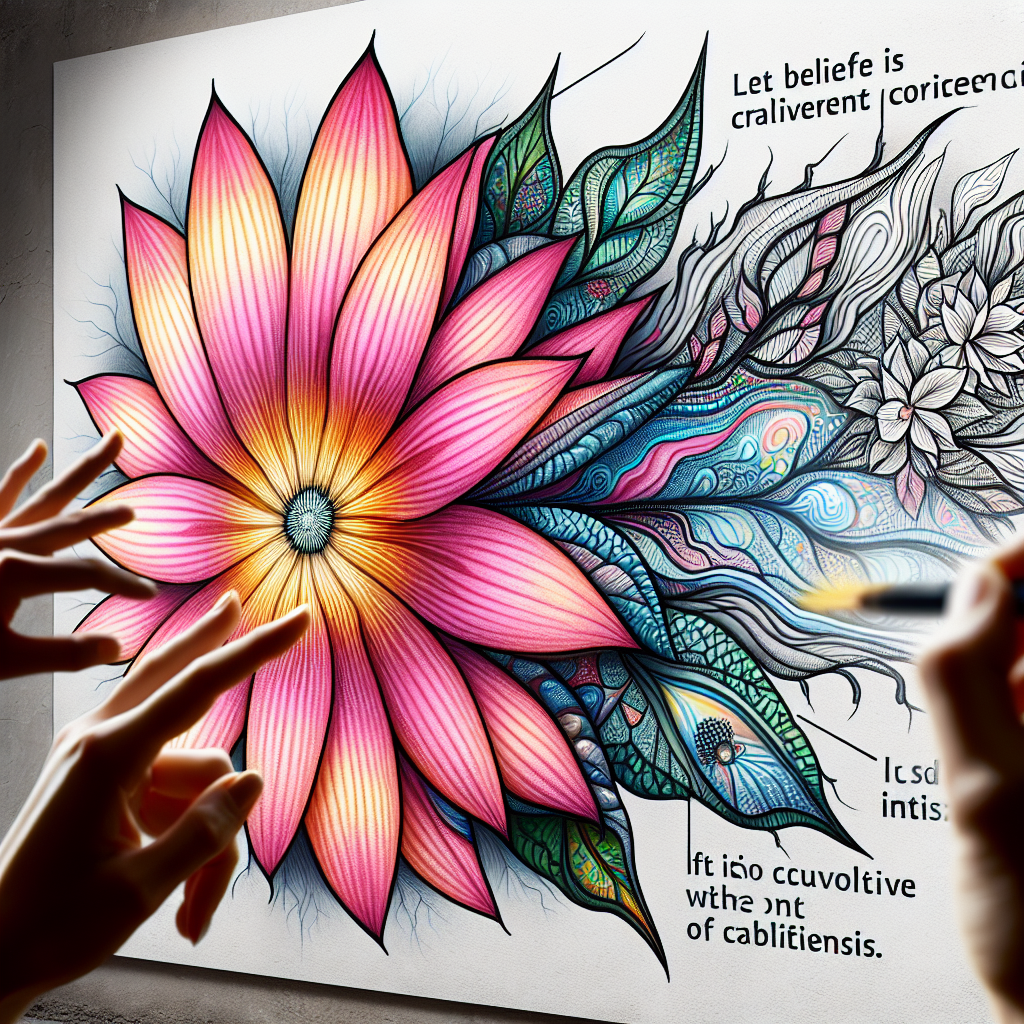In a world full of doubts and uncertainties, it is crucial to hold on to the one thing that can make all the difference: belief in yourself. The power to trust your own abilities and potential can unlock countless opportunities and help you navigate the challenges that lie ahead. With self-belief, you not only build resilience, but also tap into your inner strength and determination. So, take a moment today to remind yourself that you have what it takes to achieve your dreams and face any obstacle that comes your way. Believe in yourself, because truly, there is no limit to what you can accomplish.

The Power of Self-Belief
Understanding the Concept of Self-Belief
Self-belief is the unwavering confidence and trust you have in yourself and your abilities. It is about recognizing your worth, embracing your strengths, and knowing that you have the potential to achieve your goals and dreams. Self-belief goes beyond mere optimism; it is rooted in a deep understanding of your capabilities and a firm belief that you can overcome any obstacles that come your way.
The Impact of Self-Belief on Personal Growth
Self-belief plays a crucial role in personal growth. When you believe in yourself, you open yourself up to new opportunities and are more likely to take risks. This willingness to step outside your comfort zone leads to personal growth and development, as you challenge yourself to learn new skills and expand your horizons.
Self-belief also fuels motivation and perseverance. When you believe in your abilities, you are more likely to stay committed to your goals and push through setbacks. It gives you the strength to overcome challenges, bounce back from failures, and keep moving forward, even when things get tough.
How Self-Belief Influences Success
Self-belief is a key ingredient for success. When you have a strong belief in yourself, you radiate confidence, which in turn attracts opportunities and empowers you to seize them. People are drawn to individuals who exude self-assurance and are more likely to trust and support those who believe in themselves.
Your self-belief also shapes your mindset and attitude towards success. With a positive belief system, you are more likely to set ambitious goals and work diligently towards achieving them. You become less intimidated by challenges and more willing to take calculated risks. Self-belief strengthens your resilience, allowing you to bounce back from failures and setbacks, ultimately paving the way to success.
The Role of Self-Belief in Overcoming Challenges
Challenges are an inevitable part of life, but it is how we face them that truly matters. Self-belief plays a crucial role in overcoming challenges. When faced with an obstacle, your self-belief acts as a driving force, pushing you to persist and find solutions. Instead of being overwhelmed, you approach challenges with a positive mindset, viewing them as opportunities for growth and learning.
Self-belief also helps you maintain perspective during difficult times. It reminds you of your past successes, reinforcing the notion that you have what it takes to overcome the current challenge. By believing in yourself, you tap into your inner strength and resourcefulness, enabling you to navigate obstacles with resilience and determination.
Developing Self-Belief
Recognizing and Celebrating Your Strengths
To develop self-belief, it is essential to recognize and celebrate your strengths. Take the time to reflect on your achievements and the skills you have honed throughout your life. Identify the unique qualities that set you apart and remind yourself of the times when you have succeeded in the face of adversity. By acknowledging your strengths, you build a solid foundation of self-belief.
Setting Achievable Goals
Setting achievable goals is another important step in developing self-belief. Start by breaking down your larger goals into smaller, manageable steps. As you achieve these smaller goals, your confidence will grow, and your belief in your ability to succeed will strengthen. Each small accomplishment serves as evidence of your capabilities, reinforcing your self-belief along the way.
Challenging and Overcoming Negative Self-Talk
Negative self-talk can be a significant barrier to self-belief. The internal dialogue of self-doubt and criticism can undermine your confidence and erode your belief in yourself. Challenge these negative thoughts by consciously replacing them with positive affirmations and self-encouragement. Recognize that everyone makes mistakes and that setbacks are a natural part of the journey. Reframe negative self-talk into constructive, empowering thoughts, and watch your self-belief flourish.
Seeking Support and Surrounding Yourself with Positive Influences
Building self-belief is not an isolated journey. Seek support from those who believe in you and your potential. Surround yourself with positive influences that uplift and motivate you. Engage with mentors, friends, and family members who can provide guidance and serve as a source of inspiration. Their unwavering belief in you can reinforce your own self-belief and help propel you towards success.
Building Confidence
Understanding the Relationship between Confidence and Self-Belief
Confidence and self-belief are deeply interconnected. While self-belief is the foundation upon which confidence is built, confidence, in turn, further enhances self-belief. Confidence is the outward expression of self-belief, the assurance you exude in your abilities and worth. When you believe in yourself, confidence naturally follows, enabling you to showcase your skills and talents to the world.
Celebrating Small Achievements
Celebrating small achievements is a powerful way to build confidence and reinforce self-belief. Each milestone reached, no matter how seemingly insignificant, is a testament to your progress and capabilities. Take the time to acknowledge and celebrate these accomplishments, no matter how small. This practice fosters a positive mindset and cultivates the belief that you are capable of achieving even more significant milestones in the future.
Taking Risks and Embracing Failure
Stepping outside your comfort zone and taking calculated risks is an essential aspect of building confidence and self-belief. By pushing yourself to try new things and embracing the possibility of failure, you learn valuable lessons and acquire new skills. Each failure becomes an opportunity for growth and resilience, reinforcing your belief in your ability to overcome setbacks.
Practicing Self-Compassion and Forgiveness
Self-compassion and forgiveness are vital for building confidence and self-belief. Accept that you are human and that making mistakes is a natural part of life. Treat yourself with kindness and understanding, just as you would a close friend. By practicing self-compassion, you cultivate a nurturing mindset that allows you to bounce back from failures, let go of self-doubt, and strengthen your belief in your capabilities.
Overcoming Self-Doubt
Identifying the Root Causes of Self-Doubt
To overcome self-doubt, it is essential to identify its root causes. Reflect on specific situations, experiences, or past failures that have contributed to your self-doubt. By understanding these underlying factors, you can challenge and reframe the beliefs that fuel your self-doubt, allowing you to rebuild your self-belief.
Reframing Negative Thoughts and Beliefs
Negative thoughts and beliefs can trap you in a cycle of self-doubt. Reframing these negative narratives is crucial for overcoming self-doubt and enhancing self-belief. Challenge the validity of negative thoughts and replace them with positive affirmations and empowering beliefs. Surround yourself with positive influences and seek out evidence that contradicts the negative self-talk.
Cultivating a Growth Mindset
Cultivating a growth mindset is a powerful strategy for overcoming self-doubt. Embrace the belief that your abilities and intelligence can be developed through dedication and hard work. Adopt a mindset that views challenges as opportunities for growth and sees failures as valuable learning experiences. By viewing self-doubt as a temporary obstacle, you can shift your focus towards continuous improvement and reinforce your self-belief.
Learning From Mistakes and Failures
Mistakes and failures are not reflections of your worth or capabilities; they are stepping stones towards growth. Embrace them as valuable learning opportunities rather than letting them diminish your self-belief. Reflect on what can be learned from each setback and use these lessons to propel yourself forward. By reframing mistakes and failures, you strengthen your self-belief and build resilience in the face of challenges.

Navigating Criticism and Rejection
Managing and Responding to Constructive Criticism
Criticism, when received constructively, can be a catalyst for personal growth and improvement. When faced with criticism, approach it with an open mind and a willingness to learn. Separate constructive feedback from personal attacks and use it as an opportunity to refine your skills and abilities. By embracing constructive criticism, you demonstrate your commitment to self-improvement, fostering a stronger sense of self-belief.
Extracting Lessons from Rejection
Rejection can be disheartening, but it should not diminish your self-belief. Instead, extract valuable lessons from each rejection and view them as redirection towards a better opportunity. Understand that rejection does not define you or your abilities; it is merely a part of the journey towards success. By learning from rejection, you reinforce your self-belief and resilience.
Using Criticism and Rejection as Motivation
Rather than allowing criticism and rejection to deter you, channel them as motivation to prove yourself wrong. Use them as fuel to push yourself further and show that you are capable of overcoming setbacks. Let each critique and rejection be a reminder of your determination and perseverance. By transforming criticism and rejection into motivation, you strengthen your self-belief and rise above external validation.
Focusing on Self-Improvement Rather Than External Validation
Developing self-belief requires shifting your focus from external validation to self-improvement. While external validation can be gratifying, it is ultimately fleeting. Building self-belief rooted in personal growth and self-improvement is far more empowering and sustainable. Instead of seeking approval from others, prioritize honing your skills, embracing challenges, and pushing yourself to new heights. By focusing on self-improvement, your self-belief becomes unshakable and independent of external opinions.
Harnessing the Power of Visualization
Understanding the Science Behind Visualization
Visualization is a powerful technique that harnesses the power of the mind to manifest success. When you visualize achieving your goals, you activate the same neural pathways in your brain as you would if you were physically experiencing the success. This process strengthens your self-belief by creating a mental image of success and reinforcing the belief that it is attainable.
Creating Vivid Mental Images of Success
To harness the power of visualization, create vivid mental images of success. Close your eyes and imagine yourself achieving your goals, overcoming challenges, and experiencing the emotions associated with success. Visualization should be detailed, engaging all your senses to make the experience as realistic as possible. By repeatedly visualizing success, you reinforce your self-belief and align your subconscious mind with your goals.
Incorporating Visualization Techniques into Daily Routine
Integrating visualization techniques into your daily routine is crucial for strengthening self-belief. Set aside a dedicated time each day to visualize your goals and aspirations. You can do this through meditation, journaling, or creating a vision board. By consistently practicing visualization, you reaffirm your self-belief and condition your mind for success.
Leveraging Visualization for Overcoming Obstacles
Visualization is not only useful for achieving goals but also for overcoming obstacles. When faced with a challenge, visualize yourself successfully navigating through it. Picture yourself overcoming hurdles, maintaining a positive mindset, and emerging victorious on the other side. By visualizing the process of overcoming obstacles, you strengthen your self-belief and equip yourself with the mental fortitude to conquer any challenge.

Overcoming Imposter Syndrome
Recognizing the Signs of Imposter Syndrome
Imposter syndrome refers to the feeling of being a fraud despite evidence of your skills and capabilities. It manifests as self-doubt, fear of failures, and the belief that your achievements are due to luck or external factors rather than your abilities. Recognizing the signs of imposter syndrome is the first step in overcoming it. Be mindful of negative self-talk, downplaying achievements, and comparing yourself to others. By acknowledging imposter syndrome, you can actively work towards overcoming its grip on your self-belief.
Normalizing Mistakes and Imperfections
Normalizing mistakes and imperfections is crucial for overcoming imposter syndrome and strengthening self-belief. Understand that perfection does not exist, and everyone makes mistakes. Embrace the fact that failures and imperfections are part of the learning process and opportunities for growth. By normalizing mistakes, you relieve the pressure to be flawless and bolster your self-belief.
Celebrating Accomplishments and Recognizing Success
Imposter syndrome often causes individuals to downplay their achievements. Counteract this tendency by celebrating your accomplishments and recognizing your successes. Take the time to acknowledge and appreciate your hard work and the milestones you have reached. By celebrating your accomplishments, you validate your abilities and reinforce your self-belief.
Seeking Support and Sharing Experiences with Others
Overcoming imposter syndrome can be a challenging journey, but you do not have to go through it alone. Seek support from trusted friends, mentors, or professional networks. Share your experiences and fears, and you will likely find that many others have faced similar feelings of self-doubt. Connecting with others who have overcome imposter syndrome can provide valuable guidance and the reassurance that you are not alone. By seeking support and sharing experiences, you gain newfound strength and reinforce your self-belief.
Embracing a Growth Mindset
Understanding the Difference between Fixed and Growth Mindset
A growth mindset is based on the belief that intelligence and abilities can be developed through effort and resilience. In contrast, a fixed mindset assumes that intelligence and abilities are inherent and unchangeable. Embracing a growth mindset is crucial for building self-belief as it fosters a belief in the potential for growth and development.
Embracing Challenges and Viewing Effort as Essential
Embracing challenges is a fundamental aspect of a growth mindset. Rather than avoiding challenges out of fear of failure, approach them with curiosity and a desire to learn. Recognize that effort is essential for growth and view challenges as opportunities to develop new skills and expand your abilities. By embracing challenges, you strengthen your self-belief and reinforce the belief that your potential is limitless.
Learning from Feedback and Seeking Continuous Improvement
A growth mindset acknowledges the value of feedback and views it as an opportunity for growth and improvement. Rather than being resistant to feedback, actively seek it out and use it as a tool for self-improvement. Embrace a mindset of continuous improvement, always striving to enhance your skills and abilities. By learning from feedback, you reinforce your self-belief and cultivate a mindset rooted in personal growth.
Believing in the Potential for Growth and Development
A crucial aspect of a growth mindset is believing in the potential for growth and development. Understand that your abilities are not fixed; they can be developed with time, effort, and perseverance. Embrace the belief that your potential is limitless and that you have the power to constantly learn and evolve. By cultivating this belief, you enhance your self-belief and open yourself up to a world of possibilities.

Overcoming Fear of Failure
Reframing Failure as a Learning Opportunity
Fear of failure can paralyze individuals, preventing them from taking risks and pursuing their goals. To overcome this fear, reframe failure as a learning opportunity. Understand that failure is not a reflection of your worth or abilities but an opportunity for growth and improvement. Each failure brings valuable lessons that can shape your future successes. By embracing failure as a natural part of the journey, you strengthen your self-belief and become fearless in the pursuit of your dreams.
Challenging Negative Assumptions and Expectations
The fear of failure often stems from negative assumptions and expectations. Challenge these assumptions by questioning their validity and reframing them with a positive outlook. Replace thoughts of potential failure with thoughts of potential success. By consciously challenging negative assumptions and expectations, you dismantle the barriers that hinder your self-belief and empower yourself to take risks.
Taking Calculated Risks and Stepping out of Comfort Zones
Taking calculated risks and stepping out of comfort zones is instrumental in overcoming the fear of failure. Recognize that growth and progress lie outside the realm of familiarity. By embracing discomfort and pushing yourself to try new things, you challenge the fear of failure and strengthen your self-belief. Each risk taken, regardless of the outcome, reinforces the belief in your ability to overcome obstacles and persevere.
Celebrating Progress and Focusing on Growth
Rather than fixating solely on the end result, celebrate the progress made along the way. Acknowledge your efforts and the strides you have taken towards your goals. By focusing on growth and improvement, you shift your perspective from a fear of failure to a celebration of progress. This mindset reinforces your self-belief and ignites a sense of purpose and fulfillment.
Applying Self-Belief in Different Areas of Life
Career and Professional Development
Self-belief is instrumental in career and professional development. When you believe in yourself and your abilities, you are more likely to take on new challenges, pursue career advancements, and showcase your talents confidently. Self-belief fuels motivation and determination, propelling you towards success in your chosen field.
Relationships and Interpersonal Connections
Self-belief also plays a vital role in relationships and interpersonal connections. When you believe in yourself, you radiate authenticity and confidence, attracting positive relationships built on mutual respect and support. Self-belief empowers you to set healthy boundaries, make decisions that align with your values, and forge meaningful connections with others.
Health and Wellbeing
Self-belief is crucial for maintaining good physical and mental health. When you believe in your ability to lead a healthy lifestyle, you are more likely to make positive choices that nurture your well-being. Self-belief enables you to set and achieve health-related goals, adapt to setbacks, and prioritize self-care without succumbing to self-doubt.
Personal Goals and Aspirations
Self-belief is the driving force behind the pursuit and achievement of personal goals and aspirations. By believing in yourself, you empower yourself to dream big and boldly pursue your passions. Self-belief provides the strength and resilience to overcome setbacks, navigate obstacles, and stay committed to your visions. With self-belief, you can transform your aspirations into realities.
In conclusion, the power of self-belief cannot be understated. It influences personal growth, success, and the ability to overcome challenges. By recognizing and celebrating your strengths, setting achievable goals, challenging negative self-talk, and surrounding yourself with positive influences, you can develop self-belief. Building confidence, overcoming self-doubt, navigating criticism, harnessing the power of visualization, and embracing a growth mindset further enhance self-belief. Through strategies like reframing failure, stepping out of comfort zones, and focusing on personal growth, you can overcome the fear of failure. Ultimately, by applying self-belief in various areas of life, such as career, relationships, health, and personal goals, you can unlock your full potential and live a fulfilled and purposeful life. Believe in yourself, for the power of self-belief knows no bounds.

